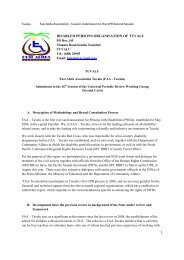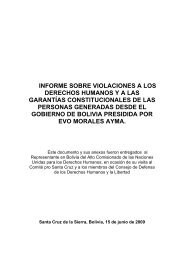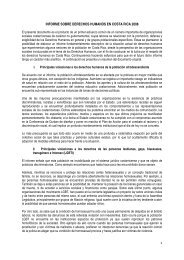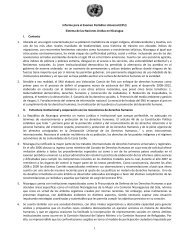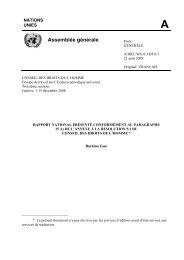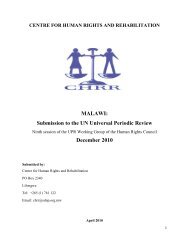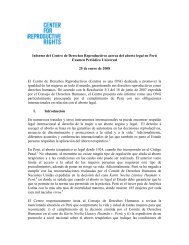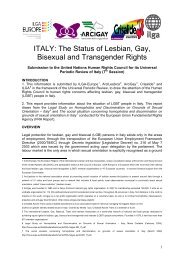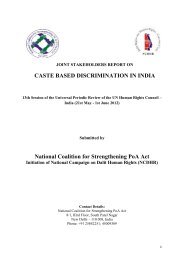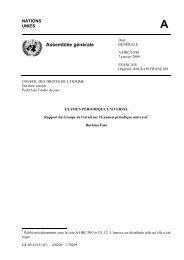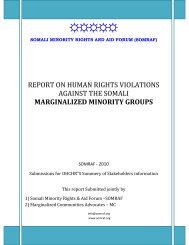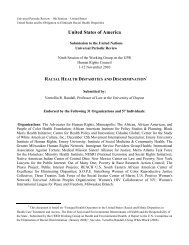Prison Needle Exchange: Lessons from a Comprehensive Review ...
Prison Needle Exchange: Lessons from a Comprehensive Review ...
Prison Needle Exchange: Lessons from a Comprehensive Review ...
You also want an ePaper? Increase the reach of your titles
YUMPU automatically turns print PDFs into web optimized ePapers that Google loves.
Evaluation and lessons learned<br />
An evaluation was conducted of the pilot programs in Vechta and Lingen 1 Dept Groß-Hesepe<br />
after two years. 149 The evaluation yielded results very similar to those found in Switzerland.<br />
The provision of sterile needles did not lead to an increase in drug use, and the amount of<br />
drugs seized within the prison did not change with the availability of needle exchange. In<br />
fact, the number of drug users entering treatment programs actually increased after the<br />
implementation of the pilot, indicating that, as is the case in the outside community, prison needle<br />
exchange programs are effective outreach and referral points for people who inject drugs.<br />
There were no instances of syringes being used as weapons against staff or other prisoners,<br />
despite the fact that over 20,000 syringes were distributed in the two institutions during<br />
the two-year pilot phase. Observance of the program rules by participants was found to be<br />
high, with only occasional minor infractions occurring in the prop-<br />
er storage of syringes by some prisoners, or the possession of<br />
syringes by some prisoners in the methadone program (who were<br />
not allowed to also be part of the needle exchange project).<br />
Staff and prisoners both found the existence of the program nonthreatening.<br />
Staff adapted quickly to the new programs, which came<br />
be seen as a normal part of the institutional routine. There were differences<br />
found in the level of acceptance of the programs by prisoners<br />
in the two different institutions. The evaluator reported that the women in Vechta had<br />
much more confidence and trust in the program than did the men in Lingen. This was the<br />
result of the differing methods of needle distribution in the two prisons (anonymous dispensing<br />
machines in Vechta; hand-to-hand distribution by prison health staff in Lingen). It<br />
was found that many prisoners in Lingen were hesitant to participate in the program, as doing<br />
so would be to identify themselves to staff as injection drug users.<br />
Finally, the evaluator found that there were no new cases of HIV among the participants<br />
who were permanent members of the exchange program. A significant decrease in abscesses was<br />
also identified.<br />
Lichtenberg, which was visited in the preparation of this report, has experienced no incidents<br />
of syringes being used as weapons, although one staff member suffered an accidental<br />
needle-stick injury. In this incident, a staff member found a syringe in the prison and stored<br />
it in an envelope. A second staff member was accidentally pricked when picking up the envelope.<br />
At the start of the program in Lichtenberg, there were a significant number of<br />
exchanges, although the rate has since declined. Staff attribute this to the fact that many<br />
women participated in the program initially, as they believed that a<br />
Since 2001, prison syringe<br />
exchange programs in<br />
Germany have come under<br />
political attack.<br />
Since the termination of the<br />
prison needle exchange<br />
program, many prisoners<br />
have started to share<br />
syringes.<br />
high level of participation would ensure the continuation of the<br />
intervention.<br />
Current situation<br />
Since 2001, prison syringe exchange programs in Germany have<br />
come under political attack. In 2002 needle exchange programs<br />
operating in the Hannöversand women’s prison, Am Hasenberge<br />
men’s prison, and the Vierlande open prison (men and women) in<br />
Hamburg were terminated. The decision to terminate the programs was taken by a centreright<br />
coalition government formed in September 2001, in the absence of any reports or other<br />
evidence of problems with the programs. It is clear that the termination of the programs was<br />
politically and ideologically motivated. Ignoring six years of evidence of the success of<br />
prison syringe exchange programs in Germany, the governing coalition acted to abolish<br />
28 <strong>Prison</strong> <strong>Needle</strong> <strong>Exchange</strong>: <strong>Lessons</strong> <strong>from</strong> a <strong>Comprehensive</strong> <strong>Review</strong> of International Evidence and Experience



